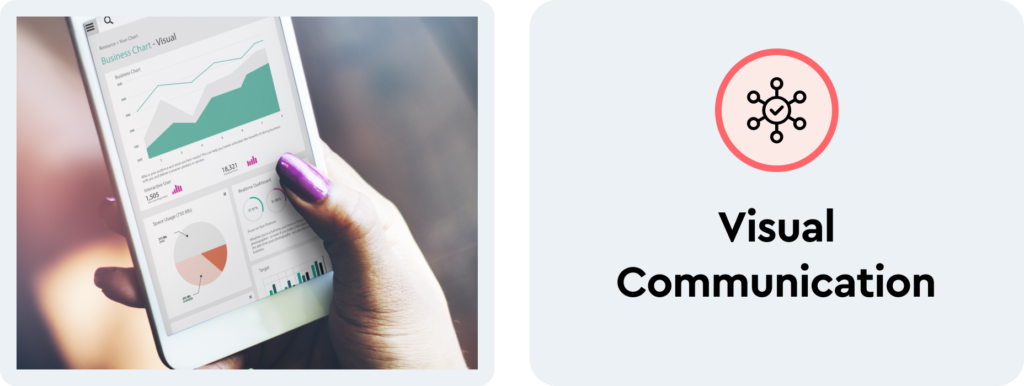The pandemic changed workplace dynamics forever. And in the post-COVID era, they continue to evolve. Everything—from job types to essential skills—is being redefined. Technical, job-specific skills are no longer adequate to ensure employee success. McKinsey & Company reported in 2021 that to better prepare students for the ever-changing career landscape, educators must instill five key soft skills, predicted to be essential for the future workforce.
In support of this finding, the Western Interstate Commission for Higher Education (WICHE) Cooperative for Educational Technologies (WCET) found that only 7% of employers will hire an applicant who has the required technical skills but lacks the ability to think critically—while more than half of employers will hire a candidate who can think critically, but lacks technical skills.
Here are the five important soft skills your students will need:
1. Visual Communication: using visual or graphic elements to communicate information quickly and effectively
Example: Using shapes and lines to depict processes
Employers of all kinds include some form of visual communication in their training, communications, and marketing materials. And there are countless data visualization methods and softwares designed for that purpose. To help prepare students for this trend, educators can expand acceptable modes of assignment submission to include video or data visualization (spreadsheets, e.g.) Writing a traditional essay, though informational and useful in the past, won’t prepare them for their future workplace.
2. Virtual Communication: communicating remotely through audio and/or video, rather than in person
Example: Participating in a department meeting via Zoom
Post-pandemic, many employers have switched to a hybrid workplace model. So, they’re looking to hire employees who can effectively connect and perform digitally. To begin preparing students for this future expectation, educators can teach fundamental online etiquette and best practices—like proper use of the “mute” button and background settings, for example.
3. Collaboration: two or more people working together toward a common goal
Examples of associated skills: flexibility, patience, positivity, tact, open-mindedness, accountability
Students have been collaborating for as long as they’ve been learning. But today, the practice is a bit more complex. It involves people with distinct skills combining and finessing individual output to achieve a greater result. To do so effectively, group members need to be self-aware, become moderately acquainted, and set joint goals. One way to prepare students for such a team dynamic is to assign groups and require each member to help draft a collaborative blueprint to guide their work.
4. Skills: the ability to put knowledge into practice
Example: Editing copy for proper grammar and punctuation
Employers of the future are not just looking for critical thinkers. They are seeking those who have experience “doing.” A skilled candidate can show mastery of various tools and technologies. The most employable candidate has a balance of conceptual knowledge and demonstrable skills. To better prepare students for success, educators can invite experts to model essential skills, promote supplemental skill-building through LinkedIn, or collaborate with their school’s student-success advocates to provide additional hands-on training.
5. Emotional Intelligence: the ability to manage one’s emotions to communicate effectively and with empathy, and overcome conflict
Five key elements:
- Self-awareness
- Self-regulation
- Motivation
- Empathy
- Social skills
Continued changes in the workplace present a number of challenges. And as humans, employees may become emotional when difficulties arise. Educators can help prepare their students to handle future stressors by teaching coping mechanisms, self-awareness, and awareness of their environment.
Encouraging Students to Develop Soft Skills
Traditionally, soft-skill evaluation occurs only in general education courses that explicitly teach those skills—like introductory composition, critical reading, public speaking, etc. And although it’s important to include snapshot data from such courses when reporting on institution-wide student performance, this approach doesn’t capture the learning that occurs over time across all courses and programs, nor does it reveal weaknesses that need to be addressed outside the general education core.
In addition to general education courses, the development of soft skills has been integrated into classroom activities and assessments of student performance in an array of activities—including case studies, special projects, group work, and oral and written presentations.
Using Video for Soft Skill Engagement & Development
While video is commonly thought of as a tool for visual communication, it actually incorporates the application of a number of soft skills at once. Here are four ways to leverage video for skill development:
- Self Reflection – Research shows that video + feedback increases reflective practice, which instills the fundamental skills of a lifelong learner: ownership of learning, valuing and applying feedback, and focusing on growth and competency. Self-reflection is not just a skill students need to enter the workforce, it’s a great way for instructors to keep students engaged. Including students as part of the assessment process leads to more meaningful conversations. With video, students can watch their recording at any time, repeatedly, and reflect on their performance.
- Skill Assessment – With video, any skill you teach can be practiced, observed, and assessed. Students find that the use of video helps them stay engaged in their courses, and they appreciate receiving more timely, specific, and detailed feedback on their assignments through video assessment..
- Experiential Learning – Any time we can offer students the opportunity to actively do something, we help them bridge the gap between theory and practice. This approach also helps students stay engaged. With video, students can do an activity, record it, and receive feedback and a grade on the assignment simply and easily.
- Feedback for Peers (Peer Reviews) – Knowing how to provide feedback is a key skill required in the workforce, and for instructors, it’s an opportunity to involve peers in each assignment. With video, peers are able to watch recordings of other students’ assignments and provide targeted feedback on what went well and what could have gone better. Peer feedback can be used to supplement instructor feedback, while allowing students to practice the art of assessment.
Examples of Video Application for Skill Development
Here are some practical examples of useful video assignments that instructors might assign to students:

Skills Demonstration: student records an assignment and uploads video for feedback and grading.
Prompt: students respond to a case study by demonstrating how they would visually present the data included.

Summative Group Project: students take turns delivering components of a professional presentation via videoconference.

Group Assignment: student groups discuss and reflect on a question using the group assignment feature.
Skills Demonstration: Students record themselves roleplaying a scenario and instructors provide targeted, timestamped feedback on skills.

Skills Demonstration: Students record themselves performing a required skill—either on their own or with a classmate—and turn it in for evaluation.

Self and Peer Review: Students provide feedback on their own work and their peers’ work using a video assessment tool.
Stimulus Assignment: Students respond to a scenario and demonstrate communication techniques.

The importance of soft skills can’t be overstated. It’s essential to continually modify teaching methods and content to keep pace with changes in workplace dynamics. After all, the purpose of a good education is to prepare students for the challenges they’re sure to encounter in their future careers.












